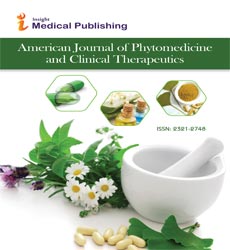ISSN : 2321-2748
American Journal of Phytomedicine and Clinical Therapeutics
Pharmacognosy's Metabolomics Method and Uses
Anna De Pasquale*
Department of Pharmaco-biological, University of Messina, Messina, Italy
- *Corresponding Author:
- Anna De Pasquale
Department of Pharmaco-biological,
University of Messina, Messina,
Italy,
E-mail: PasqualeD@gmail.com
Received date: November 09, 2023, Manuscript No. IPAPCT-24-18555; Editor assigned date: November 12, 2023, PreQC No. IPAPCT-24-18555 (PQ); Reviewed date: November 26, 2023, QC No. IPAPCT-24-18555; Revised date: December 02, 2023, Manuscript No. IPAPCT-24-18555 (R); Published date: December 09, 2023, DOI: 10.36648/2321-2748.11.5.264
Citation: Pasquale AD (2023) Pharmacognosy's Metabolomics Method and Uses. Am J Phytomed Clin Ther Vol.11 No.5: 264.
Introduction
Pharmacognosy, the scientific study of natural products derived from plants and other natural sources, has witnessed a significant transformation in recent years. Metabolomics, a cutting-edge analytical technique, has revolutionized the field by enabling comprehensive analyses of the complex chemical compositions of natural products. This article aims to delve into the application of metabolomics in pharmacognosy, highlighting its methodologies, advantages, and the profound impact it has had on the discovery and development of novel therapeutic compounds. Metabolomics methodologies, ranging from Nuclear Magnetic Resonance (NMR) Spectroscopy to Mass Spectrometry (MS) and chromatographic techniques, serve as the beacon guiding researchers through the labyrinthine chemical compositions of natural products. These analytical approaches empower scientists to identify, quantify, and understand the diverse array of metabolites present in complex mixtures, providing a holistic view of their biological activities and potential medicinal benefits. Moreover, the integration of advanced data analysis tools such as bioinformatics and chemometrics has augmented the interpretation of vast datasets generated from metabolomics studies. This synergy facilitates the extraction of meaningful insights, guiding the identification of bioactive compounds, understanding metabolic pathways, and ensuring the quality and authenticity of herbal remedies and natural extracts.
Metabolomics
Metabolomics is a multidisciplinary approach that involves the systematic study of small molecules or metabolites present in biological systems. In pharmacognosy, metabolomics plays a pivotal role in the analysis of plant extracts, herbal remedies, and natural products. It allows researchers to profile and characterize the diverse array of metabolites present in these sources, providing valuable insights into their chemical composition, bioactivity, and potential therapeutic applications. Metabolomics allows for the simultaneous detection and quantification of a wide range of metabolites present in natural sources. This comprehensive profiling offers insights into the diverse chemical constituents of plants, herbs, marine organisms, and other natural products. One of the primary objectives of pharmacognosy is to identify bioactive compounds that possess therapeutic potential.
Metabolomics plays a pivotal role in identifying and characterizing these bioactive molecules, facilitating the isolation of novel compounds for drug development. Metabolomics assists in quality control measures by providing robust analytical methods to authenticate natural products. It helps in verifying the authenticity, purity, and consistency of herbal medicines and botanical extracts, ensuring their efficacy and safety for use. Metabolomics aids in deciphering the intricate metabolic pathways within plants and other natural sources. By elucidating these pathways, researchers gain a deeper understanding of how these organisms produce bioactive compounds and respond to environmental factors, paving the way for sustainable utilization and cultivation practices. The application of metabolomics expedites the drug discovery process by rapidly screening and identifying potential lead compounds from natural sources.
Methodologies
Metabolomics methodologies encompass various analytical techniques such as Nuclear Magnetic Resonance Spectroscopy (NMR), Mass Spectrometry (MS), and chromatography coupled with detection systems. These methods facilitate the identification and quantification of metabolites present in complex mixtures, thereby enabling researchers to construct metabolic profiles or fingerprints of natural products. NMR spectroscopy is employed to elucidate the structures of metabolites by analyzing their unique chemical shifts. Mass spectrometry, coupled with techniques like Liquid Chromatography- Mass Spectrometry (LC-MS) or Gas Chromatography- Mass spectrometry (GC-MS), enables high-throughput analysis and identification of metabolites based on their massto- charge ratios. The integration of metabolomics in pharmacognosy offers several advantages. Firstly, it allows for a holistic and unbiased approach to comprehensively study the chemical composition of natural products, uncovering rare or previously unknown metabolites with potential therapeutic properties. Moreover, metabolomics assists in quality control of herbal medicines by identifying markers indicative of their authenticity, purity, and efficacy. Furthermore, this approach expedites the discovery of bioactive compounds, facilitating the development of new drugs or nutraceuticals derived from natural sources.

Open Access Journals
- Aquaculture & Veterinary Science
- Chemistry & Chemical Sciences
- Clinical Sciences
- Engineering
- General Science
- Genetics & Molecular Biology
- Health Care & Nursing
- Immunology & Microbiology
- Materials Science
- Mathematics & Physics
- Medical Sciences
- Neurology & Psychiatry
- Oncology & Cancer Science
- Pharmaceutical Sciences
